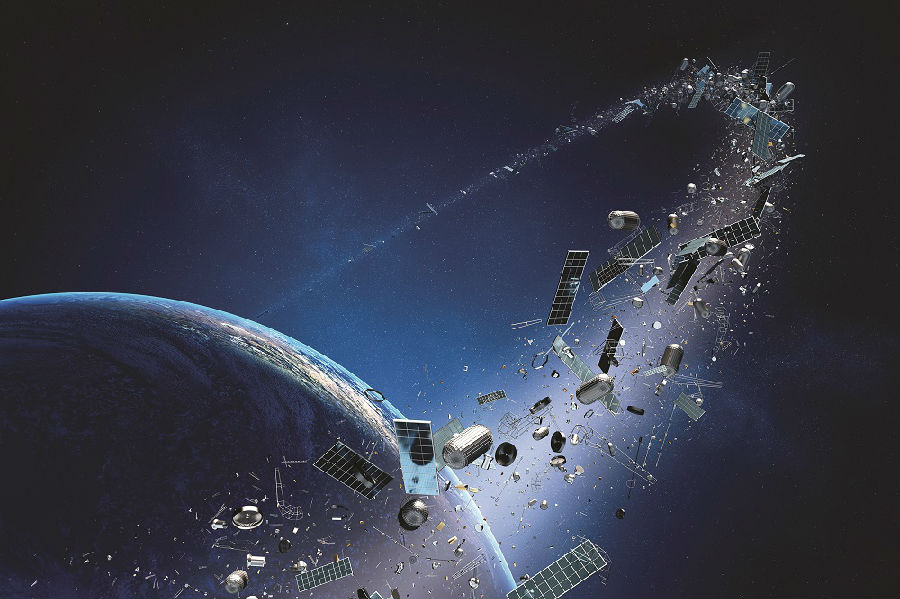Hey, there.
嘿,大家好。
It's Trace for dnews.
我是Trace,欢迎大家收看本期的DNews视频。
And the word "space" might conjure up a picture of something big and vast and empty, but in our case, it's full of junk.
“太空”这个词可能会让人联想到一个既浩瀚又空旷的东西,但我们今天要说的太空是充满了垃圾的太空。
That's right, people.
是的,各位。
We are the guy on the block with the rusty car in the front lawn, the broken flamingoes everywhere on the crappy couch on his porch.
我们就是社区里那个家门口的草坪上有一辆生锈的汽车,门廊下破烂的沙发上堆满了破旧的火烈鸟抱枕的那个邋遢的人。
We have let space junk get out of hand and it's everywhere now.
太空垃圾问题已经失控了,如今,太空垃圾已经泛滥成灾了。
We've only been going to space for 60 years and we've already made a mess of it.
我们进行太空探索的时间才不过60年,但我们就已经把太空搞得乱七八糟了。
Back in the 50s and 60s, every time we would go up to space, chunks of the spaceship would be dropped off to save weight.
五六十年代的时候,我们每次上太空都会为了减重数次丢掉飞船的配重。
And they didn't break off all in one piece.
问题是,这些配重并不是整块地脱离飞船的。
There are little bits and things zooming around all over up there.
以致于现在的太空里,到处都是漂浮着的小东西,小点点,速度还都很快。
Fast-forward to today, and there are millions of pieces of space junk flying around out there at phenomenal speeds.
快进到今天,太空里已经堆积了数不清的太空垃圾飘来飘去,速度快得惊人。
And they're dangerous.
而且,它们都很危险。
They have to move the space station out of the way every now and then.
所以,他们才不得不时不时地就将空间站挪出太空垃圾的运动轨迹。
There are 21 thousand pieces of space junk that are around four inches in size or larger.
如今,大小在4英寸及更大的太空垃圾就已经有2.1万个了。
And it doesn't even have to be that big to cause a problem.
而且,太空垃圾并不需要达到4英寸这么大就能给我们带来麻烦。
This hole was created in a satellite in the 80s by a piece of space junk.
这个洞是80年代一块太空垃圾在一颗卫星上撞出来的。
And while it's only 500 microns wide, it's not good for the satellites.
虽然只有500微米宽,但对卫星来说已经不是好事了。
There are so many pieces of debris up there that NASA has a whole department dedicated to tracking it.
由于太空里的碎片垃圾实在是太多了,NASA为此还专门成立了一个部门来追踪这些垃圾。
They have a newsletter called "Orbital Debris Quarterly".
他们还出了一份名为“轨道碎片季刊”的时事通讯期刊。
And this is not a joke, they really need to be tracking this stuff.
这不是开玩笑,他们是真的需要追踪这些东西。
In 2009, a soviet-era satellite that was defunct crashed into a functioning communication satellite at 7.2 miles per second,
2009年,一颗已经报废的,苏联时代的卫星以7.2英里/秒的速度撞上了一颗正在运行的通信卫星,
creating another 1,700 pieces of space junk.
撞出了1700块新的太空垃圾。
Then, this month, a Russian rocket exploded,
这个月,一枚俄罗斯火箭又爆炸了,
leaving two fully-fueled pieces of space debris that are ballistically orbiting the earth
留下了两块马力十足的空间碎片,现在,它们正以与国际空间站
at the same level as the International Space Station and a bunch of other functioning satellites.
和其他一些正常运行的卫星相同的高度绕地球运行。
How we consider it Russia?
这件事情我们要怎么看呢,俄罗斯?
So what can we do about these pieces of space junk littering the upper atmosphere and beyond?
那么,对于些散落在大气层上层乃至更远地方的太空垃圾我们能做些什么呢?
Well, the European Union has passed the International Code of Conduct for space activities.
其实,欧盟已经通过了《太空活动的国际行为准则》。
But it's not like you can just prop a 'no space littering' sign out there, so how are we going to clean this up?
问题是,我们又不能像在地面上一样在太空里竖起一个“禁止乱扔垃圾”的牌子,那我们要怎么清理这些垃圾呢?
Likely, private space companies are going to be the first ones to start the cleanup.
私人太空公司很可能成为第一批开始清理这些垃圾的对象。

Uh, but it costs three thousand bucks to send something the size of a coke can into outer space.
只不过,把一个可乐罐大小的东西送上太空都要花三千美元。
So it's kind of prohibitively expensive.
价格劝退啊。
We can't blow up the debris because that just makes little teeny bits that fly around and puncture things.
我们也不能直接把这些碎片炸了,因为这样只会带来更多更小的碎片。
So really the simple solution is this.
所以,最简单的办法其实是这样的。
Reduce, reuse, recycle.
减少,再利用,再循环。
It's just that simple.
就这么简单。
To reduce, we build stronger satellites that can stand up to these tiny pieces of debris.
要减少这些碎片,我们就要研发能够抵抗这些微小的碎片碰撞的更强大的卫星。
To reuse, we gather up all this space junk into a giant space junkyard.
再利用,我们可以把所有这些太空垃圾收集到一个巨大的太空垃圾场。
And then to recycle, we go to the space junkyard and mine it for materials and build things right up in space.
至于回收嘛,就是我们去太空垃圾场找材料回收,直接在太空上组建新的东西。
The problem of space junk is huge.
太空垃圾的问题是个超级大块头问题。
So we'll likely be talking about it for a long time to come.
因此,未来很长一段时间我们可能都会继续讨论这个问题。
Especially as there are only a few spacefaring nations.
特别是,目前已经走向太空的国家还不多。
What happens when there are dozens or companies that are flying up and down leaving their crap everywhere?
要是已经有好几十个国家或公司飞上飞下,把他们的垃圾丢得到处都是,到时候我们要怎么办?
Do you have a cool idea for how to solve the space junk problem?
对于如何解决太空垃圾问题,你有什么好主意吗?
Make sure that you leave it in the comments below.
一定要来下方的评论区告诉我们噢。
And don't forget to subscribe to dnews to get all of our videos every day.
还有,别忘了订阅,这样你就每天都能看到我们更新的所有视频啦。
Thanks for watching, I'm Trace, catch you later.
感谢收看,我是Trace,我们下期节目再见。












